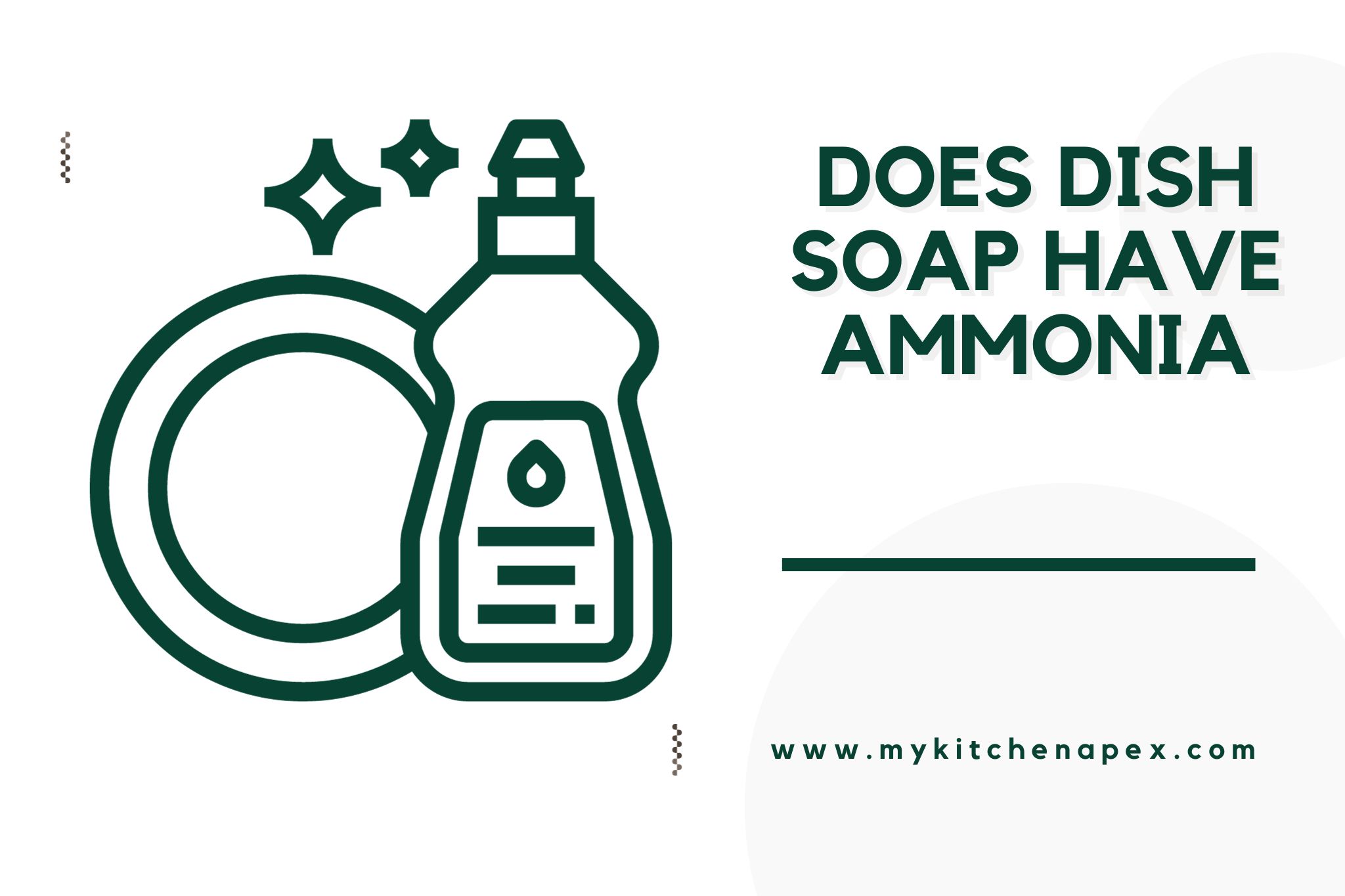Originally Created on: January 21, 2024 @ 7:13 am
Are you curious about the ingredients in your dish soap? Specifically, does dish soap contain ammonia? It’s a question that many people have asked themselves at some point. While we often associate ammonia with cleaning products, there seems to be some confusion surrounding its presence in dish soaps. In this blog post, we’ll explore whether or not dish soap contains ammonia and shed light on what you should know about this common household product.
Dish soap is an essential item in every kitchen, but understanding its composition can help you make informed choices for your home and family. So let’s dive into the world of dish soaps and discover the truth behind their ingredients – including the potential presence of ammonia. By the end of this article, you’ll have a clear understanding of what goes into your dish soap bottle and whether or not it contains ammonia. Get ready to uncover the facts and make smarter decisions when it comes to keeping your dishes sparkling clean!
Table of Content
Highlights:
- Dish soap does not typically contain ammonia.
- Ammonia is a strong alkaline compound commonly found in other cleaning products, but not dish soaps.
- Eco-friendly alternatives to ammonia-based cleaners are available for safer and gentler dishwashing.
does dish soap have ammonia
No, dish soap does not typically contain ammonia. Dish soaps are designed to remove grease and food particles from dishes, utensils, and cookware. They usually contain surfactants that help break down oils and fats, as well as other ingredients like enzymes or antibacterial agents.
Ammonia is a strong alkaline compound commonly used in cleaning products for its ability to cut through tough stains and grime. However, it can be harsh on certain surfaces and may cause damage if not used properly. While some all-purpose cleaners or specialty kitchen cleaners may contain ammonia, it is not a common ingredient in dish soaps.
If you’re looking for an alternative to ammonia-based cleaners for your dishes, there are many eco-friendly options available on the market today. These dish soaps are formulated with plant-based ingredients that are gentle on both your dishes and the environment.
In conclusion, when choosing a dish soap, it’s important to read the label carefully to understand what ingredients are included. While dish soaps do not typically contain ammonia, there may be variations among different brands and types of products.
You May Also Like: can you put dish soap in toilet tank
Ammonia in household cleaning products
Ammonia is a common ingredient found in many household cleaning products. It is known for its powerful cleaning properties and ability to cut through grease and grime. However, it’s important to understand the potential risks associated with using ammonia-based cleaners.
One of the main concerns with ammonia is its strong odor, which can be irritating to some individuals, especially those with respiratory issues or sensitivities. Additionally, mixing ammonia with certain other chemicals, such as bleach, can create toxic fumes that can be harmful if inhaled.
Despite these risks, when used properly and in well-ventilated areas, ammonia-based cleaners can be effective for tackling tough stains and disinfecting surfaces. It’s always a good idea to read the labels carefully and follow the instructions provided by the manufacturer to ensure safe usage.
Harmful effects of ammonia in cleaning agents
The harmful effects of ammonia in cleaning agents can have serious consequences for both our health and the environment. Ammonia is a powerful chemical that is commonly used in household cleaners due to its ability to cut through grease and grime. However, prolonged exposure to ammonia fumes can irritate the respiratory system, causing coughing, wheezing, and even asthma attacks. In addition, ammonia can be toxic if ingested or absorbed through the skin, leading to nausea, vomiting, and burns.
Not only does ammonia pose risks to human health, but it also has detrimental effects on the environment. When ammonia-based cleaners are washed down the drain or disposed of improperly, they can contaminate water sources and harm aquatic life. Ammonia acts as a nutrient for algae growth in bodies of water, leading to algal blooms that deplete oxygen levels and suffocate fish and other organisms. Furthermore, when released into the air during use or manufacturing processes, ammonia contributes to air pollution and smog formation.
By understanding the harmful effects of ammonia in cleaning agents, we can make more informed choices about the products we use in our homes. Opting for safer alternatives that do not contain ammonia can help protect our health and preserve the environment for future generations.
Also Read: does dish soap freeze
Are there any natural alternatives to cleaning products with harsh chemicals?
Yes, there are several natural alternatives to cleaning products with harsh chemicals that can effectively clean your home while being safer for you and the environment. One option is to use vinegar, which is a versatile cleaner that can be used on various surfaces such as countertops, floors, and windows. It has antimicrobial properties and can help remove stains and odors.
Another natural alternative is baking soda, which acts as a gentle abrasive and can be used to scrub surfaces like sinks, tubs, and ovens. It also helps eliminate unpleasant smells. Additionally, lemon juice can be used as a natural disinfectant due to its acidic properties. It works well on cutting boards, countertops, and other areas where bacteria may thrive.
These natural alternatives not only provide effective cleaning results but also offer peace of mind knowing that you’re reducing your exposure to harmful chemicals. By incorporating these eco-friendly options into your cleaning routine, you’ll create a healthier living environment for yourself and your family without compromising cleanliness or effectiveness.
Also Read: does dish soap remove hair dye
Final Thoughts
In conclusion, dish soap does not typically contain ammonia. While some all-purpose cleaners or specialty kitchen cleaners may include ammonia, it is not a common ingredient in dish soaps. It’s important to read the label carefully when choosing a dish soap and consider eco-friendly options that are gentle on both your dishes and the environment. By understanding the potential risks associated with using ammonia-based cleaners and exploring natural alternatives, you can make informed choices for a cleaner and safer home.

